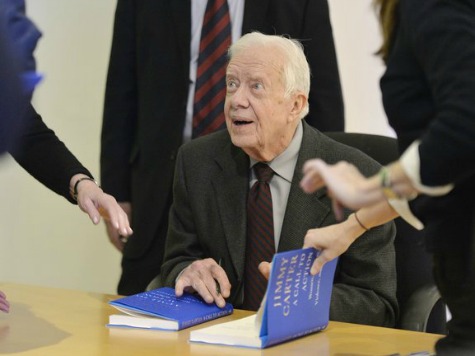Former US president Jimmy Carter on Tuesday urged his country and China, two of the world’s biggest fossil fuel polluters, to take the lead on halting climate change.
If the two economic and political giants could agree on a way forward, the rest of the world would likely follow their lead, the statesman told AFP on the sidelines of a climate change discussion with students at the Paris Institute of Political Science.
He said he had encouraged Chinese President Xi Jinping along these lines, and has had discussions with US Secretary of State John Kerry.
Carter took part in the Paris meeting on Earth Day as a representative of The Elders, a grouping of global leaders brought together by Nelson Mandela in 2007 to promote peace, justice and human rights.
He told the students that climate change threatened world peace.
The next 18 months will be crucial to determine the success of efforts to halt global warming “or catastrophic failure”, said the Nobel Peace laureate.
The UN seeks to hold warming to two degrees Celsius (3.6 degrees Fahrenheit), at which scientists believe we can still avoid the worst effects of climate change.
UN Secretary General Ban Ki-moon will host heads of state and government in New York in September to “catalyse action” ahead of a meeting in Paris at the end of 2015 where the world’s nations are due to sign a global climate pact.
The deal, which must come into operation by 2020, should outline emissions curb targets — a controversial issue that has been the topic of years of often belligerent talks.
Negotiators will gather again in Lima, Peru in December to come up with an outline for the agreement.
Carter said he hoped “as many of the world’s leaders as possible” will attend the September meeting with Ban.
Carter described climate change as “the greatest challenge the human race has ever faced”.
The most recent scientific assessment of the UN’s Intergovernmental Panel on Climate Change, released in phases over recent months, states that humankind still has a chance to limit warming to relatively safe levels, but warns of dire consequences if we don’t.

COMMENTS
Please let us know if you're having issues with commenting.